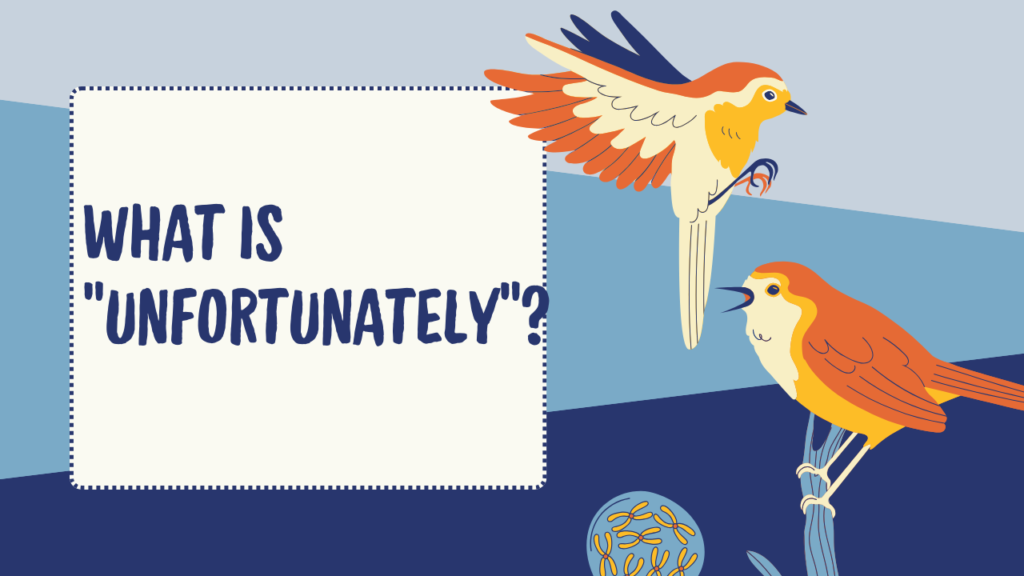Unfortunately: Definition & Meaning
Introduction
The strong adverb “unfortunately” can convey feelings of shame, letdown, or unhappiness when applied to undesirable results. There are many ways this word is used in communication, such as to make bad news more bearable, to show empathy, or to emphasize how serious a situation is. “Unfortunately” has been a part of the English language since the middle of the 16th century and is still used frequently in both formal and informal settings. This article delves into the intricacies of this term, discussing its historical relevance and how it is used in contemporary discourse.
What Is “Unfortunately”?

The word “unfortunately” is a way to say that something is regrettable or unfortunate. The word “un-” indicates the antonym of the adjective “fortunate,” from which it derives. “Unfortunately” has a special power because of the way it combines formality with relatability; alternatives such as “sadly” or “regrettably” could eventually replace it.
This adverb is useful for easing the blow of bad news or disappointment in many situations. As an example:
“Unfortunately, I can’t make it to the event tonight.”
“Unfortunately, due to unforeseen circumstances, the project timeline has been extended.”
Recognizing the negative side of a situation allows the speaker to connect with the listener and demonstrate empathy and understanding.
The Role of “Unfortunately” in Communication
Conveying Regret with Clarity
It is common practice to use “unfortunately” when breaking bad news in an empathic manner. Statements that might come across as harsh or abrupt are made more gentle by this.
Empathy in Professional Settings
Use “unfortunately” to be professional and sensitive when telling someone no to an application for a job or that there will be delays. In this case: “Unfortunately, we have decided to move forward with another candidate for this role.”
Personal Interactions
For example, “Unfortunately, I missed the deadline for the competition.” This word simplifies otherwise difficult conversations in everyday language.
Adding Emotional Depth to Narratives
The use of “unfortunately” in storytelling is a common technique for making the audience feel sorry for the narrator or immerse them in the story. In this case: “Unfortunately, the rain started just as we were setting up the picnic.”
Mitigating Criticism
A word like “unfortunately” adds a layer of complexity, showing that the speaker feels remorse for having to be critical. Example: “Unfortunately, the results didn’t meet our expectations this quarter.”
Softening the Tone of Apologies
Beginning with “unfortunately” is a common way to express regret in a sincere way. An illustration: “Unfortunately, I was unable to attend the meeting, and I apologize for any inconvenience caused.”
Building Trust in Written Communication
Using the word “unfortunately” in writing gives it a more personal tone, which is great for public relations and customer service:
“Unfortunately, we are experiencing a temporary outage, and we are working to resolve the issue as quickly as possible.”
Common Situations Where “Unfortunately” Is Used
1. Delivering Bad News
As far as I can tell, this is the most common way to say “unfortunately.” Its compassionate tone allows you to express your disappointment without turning off the receiver.
2. Explaining Unforeseen Challenges
Unanticipated challenges are a common part of life. Such events are typically described with the word “unfortunately”: “Unfortunately, the shipment was delayed due to weather conditions.”
3. Expressing Regret Over Missed Opportunities
This word is commonly used when deadlines are missed, plans are canceled, or opportunities are lost:
“Unfortunately, I couldn’t attend the workshop on time.”
4. Announcing Negative Outcomes
“Unfortunately” lays the groundwork for unsavory outcomes, whether they be competitive results or technical setbacks:
“Unfortunately, the software update caused compatibility issues with older devices.”
5. Providing Context for Setbacks
This word demonstrates empathy while explaining why something did not go as planned:
“Unfortunately, the lack of funding forced us to reconsider our expansion plans.”
How to Use “Unfortunately” in Sentences to Show Disappointment
1. Structuring Sentences for Empathy
When you use “unfortunately,” make sure to structure your sentences in a way that show your disappointment while still trying to be positive. Example: “Unfortunately, the event has been postponed, but we are excited to announce new dates soon.”
2. Balancing Professionalism and Empathy
If you must use “unfortunately” in a formal setting, make sure to also highlight what can be done to fix the problem:
“Unfortunately, the results were not as expected, but we have identified areas for improvement.”
3. Emphasizing the Unpredictability of Situations
“Unfortunately” brings a realistic tone when stressing uncertainty:
“Unfortunately, things didn’t work out as planned, but we remain committed to finding solutions.”
4. Using It as a Bridge in Narratives
“Unfortunately, after hours of searching, we still couldn’t find the lost item.” This sentence demonstrates how “unfortunately” can bridge events in storytelling, adding depth and describing progress.
Why “Unfortunately” Expresses Regret
Since it denotes a departure from the intended result, “unfortunately” is intrinsically associated with regret. The speaker often expresses their desire for a different outcome but acknowledges that they are constrained by external factors.
1. Linguistic Roots and Emotional Impact
The origins of the word go back to ideas of good fortune and luck, which recognize that unfavorable outcomes can be the result of random chance or other outside forces.
2. Role in Politeness Strategies
According to theories of effective communication, using the word “unfortunately” is one way to keep the peace in tense situations.
3. Bridging Emotional Gaps
When used correctly, this word helps to create an emotional connection between the speaker and the listener, which in turn increases mutual understanding and trust.
Examples of “Unfortunately” in Everyday Life
1. Describing Unlucky Events
“Unfortunately, it seems the flight has been delayed again due to technical issues.”
2. Offering Explanations for Setbacks
“Unfortunately, the situation didn’t improve despite our best efforts.”
3. Sharing Personal Disappointments
“Unfortunately, I missed the opportunity to meet my favorite author at the event.”
4. Narrating Unexpected Turns in Stories
“Regrettably, the treasure map was a forgery, and the adventurers were devastated.”
5. Addressing Service Interruptions
“Unfortunately, no one was available to resolve the issue during the weekend.”
Why Is “Unfortunately” Important in Formal Apologies?
The use of “unfortunately” in an apology is critical because it demonstrates understanding of the problem while retaining a polite and sympathetic tone. Example: “Unfortunately, we were unable to meet the promised timeline, and we deeply regret any inconvenience caused.”
By using the word “unfortunately,” individuals show that they are willing to take responsibility and tackle the problem head-on.
FAQs
1. Can “unfortunately” be used in positive contexts?
No, it is primarily used for negative or regrettable situations.
2. Does “unfortunately” always imply empathy?
Not necessarily, but its tone often conveys an understanding of the negative impact.
3. Is “unfortunately” appropriate in casual conversations?
Yes, it is versatile and can be used in both formal and informal settings.
4. What are alternatives to “unfortunately”?
Words like “regrettably,” “sadly,” or “lamentably” serve similar purposes.
5. How does “unfortunately” affect tone?
It softens the delivery of bad news and adds a layer of politeness to the message.
Read More: 860-833-3044: All What You Need To Know
Conclusion
“Unfortunately” is a nuanced and impactful word that expresses sadness, understanding, and recognition of negative results. It softens the blow of bad news and helps people connect on an emotional level when used in formal or informal communication. Even in trying circumstances, speakers and writers who master its subtleties are able to establish rapport, demonstrate responsibility, and strengthen relationships. No matter the context, this word is always useful for showing compassion and setting reasonable expectations, whether in a personal or professional setting. In order to keep your communication considerate, polite, and focused on people, you need to become an expert at using “unfortunately” so that your message is clear and powerful.







